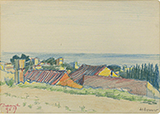Saša Stanišić: 6th grade school report
Saša Stanišić: 6th grade school report
Heidelberg was a refuge and a new beginning, precariousness and puberty, the first police check, the first romance, discarded furniture, university studies. At some point, it was belligerent self-esteem that screamed: because I can! But then I read my surname on every other gravestone in the cemetery of Oskoruša. And immediately made more of everything to do with origins, my unknown relations and the places familiar to me. (ed. trans.)
Saša Stanišić, Herkunft, 2019
In 1992, Saša Stanišić and his family fled from the war in Bosnia. Their flight ended in Heidelberg, where he and other children who had not grown up in German-speaking countries attended a class in which German was taught alongside ordinary subjects. In his novel Herkunft (2019), Stanišić uses packing as a metaphor to describe this approach: “The new language can be packed quite well but is extremely difficult to transport. You understand more than you can say. You forget endings on the baggage conveyor belts of declension, the German words are too bulky, the cases become muddled and your pronunciation always sticks out no matter how well you assemble your sentences.”
Stanišić’s 6th grade school report emphasises his rapid progress when learning German and foreshadows the creative way in which he was to use the German language. A brief anecdote in Herkunft describes the support which Stanišić received from his German teacher when he was making his first attempts to compose lyrics. This teacher hit upon the idea of using a pseudonym to present one of the poems to the class, which was then studying lyrics about flight and the loss of a home composed by Hilde Domin and Rose Ausländer. Stanišić recalls: “I owe my desire and ability to write these stories not to boundaries but to their transparency; I owe them to people who listened rather than closing themselves off.”





